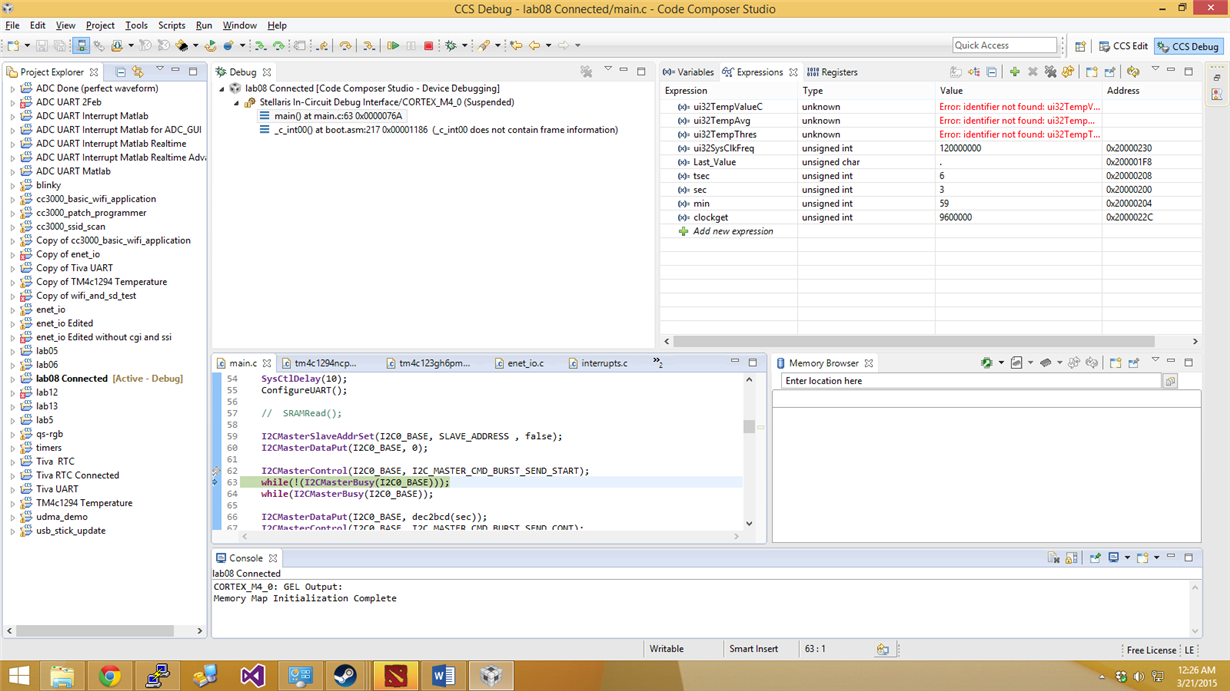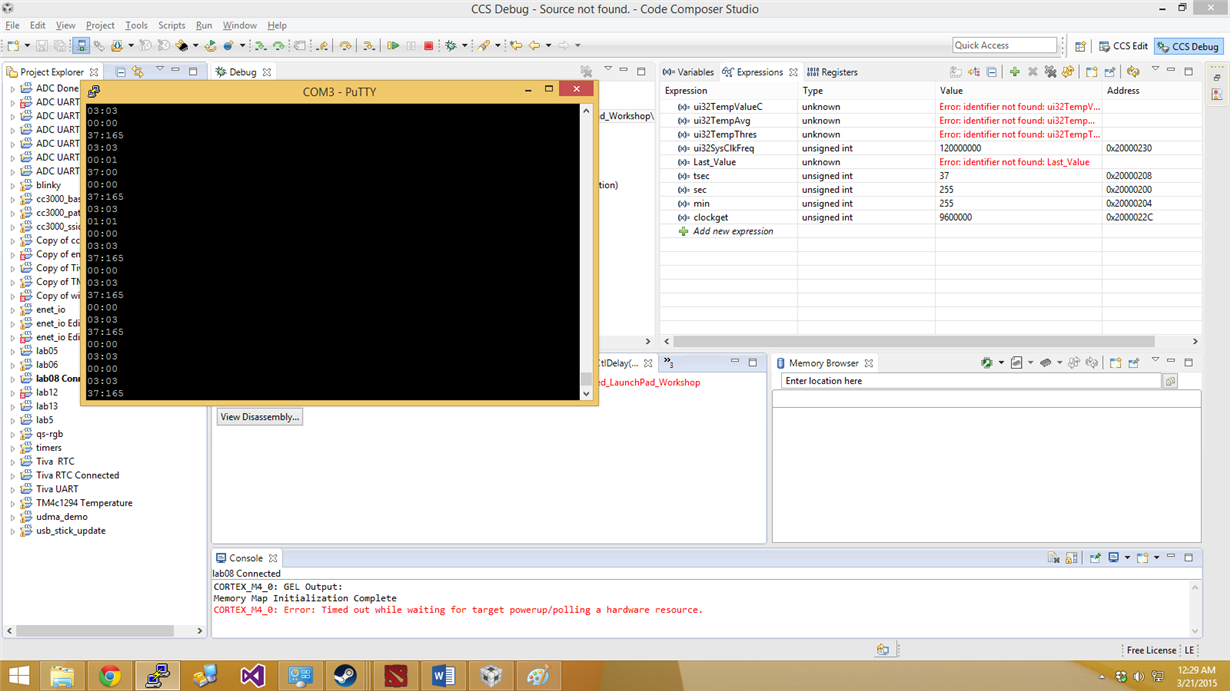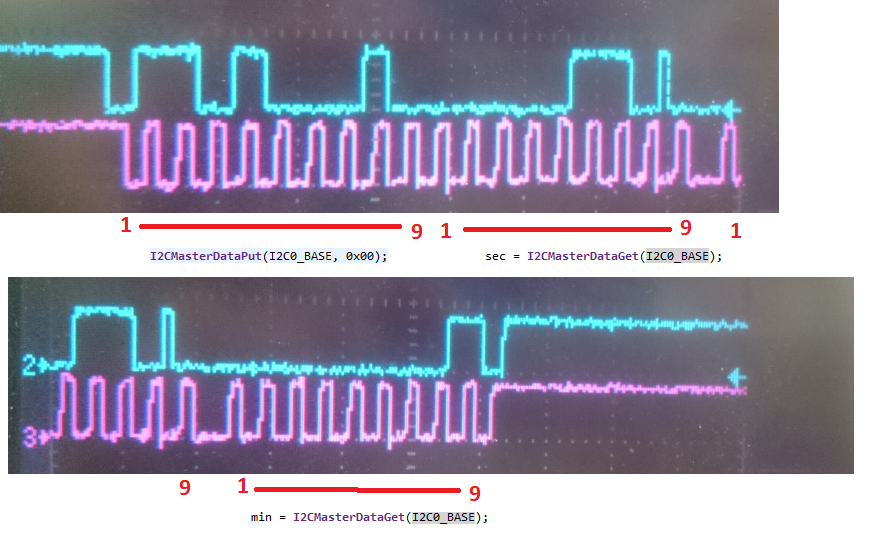Hi,
I am trying to interface DS1307 with TM4C1294(connected launchpad). I got it to work in TM4C123 but i am clueless why is it not working in Connected Launchpad. Please help me. The data I'm getting is sometimes jumbled continuously and sometimes only 00:00 is read.
unsigned int sec=3,min=59,tsec=6,tmin=10;
#define SLAVE_ADDRESS 0x68
void SRAMRead(void);
void SRAMWrite(int a,int b);
void initIO();
void ConfigureUART(void);
unsigned char dec2bcd(unsigned char val) ;
unsigned char bcd2dec(unsigned char val) ;
uint32_t ui32SysClkFreq, clockget;
//*****************************************************************************
//
// main()
//
//*****************************************************************************
int
main(void)
{
unsigned char Last_Value=1;
ui32SysClkFreq = SysCtlClockFreqSet((SYSCTL_XTAL_25MHZ |
SYSCTL_OSC_MAIN | SYSCTL_USE_PLL |
SYSCTL_CFG_VCO_480), 120000000);
clockget=SysCtlClockGet();
SysCtlPeripheralEnable(SYSCTL_PERIPH_I2C0);
SysCtlPeripheralEnable(SYSCTL_PERIPH_GPIOB);
GPIOPinConfigure(GPIO_PB3_I2C0SDA);
GPIOPinTypeI2C(GPIO_PORTB_BASE, GPIO_PIN_3);
GPIOPinConfigure(GPIO_PB2_I2C0SCL);
GPIOPinTypeI2CSCL(GPIO_PORTB_BASE, GPIO_PIN_2);
I2CMasterInitExpClk(I2C0_BASE, ui32SysClkFreq, false);
ConfigureUART();
// SRAMRead();
I2CMasterSlaveAddrSet(I2C0_BASE, SLAVE_ADDRESS , false);
I2CMasterDataPut(I2C0_BASE, 0);
I2CMasterControl(I2C0_BASE, I2C_MASTER_CMD_BURST_SEND_START);
while(I2CMasterBusy(I2C0_BASE));
I2CMasterDataPut(I2C0_BASE, dec2bcd(sec));
I2CMasterControl(I2C0_BASE, I2C_MASTER_CMD_BURST_SEND_CONT);
while(I2CMasterBusy(I2C0_BASE));
I2CMasterDataPut(I2C0_BASE, dec2bcd(min));
I2CMasterControl(I2C0_BASE, I2C_MASTER_CMD_BURST_SEND_FINISH);
while(I2CMasterBusy(I2C0_BASE));
while(1)
{
I2CMasterSlaveAddrSet(I2C0_BASE, SLAVE_ADDRESS , false);
I2CMasterControl(I2C0_BASE, I2C_MASTER_CMD_BURST_SEND_START);
I2CMasterDataPut(I2C0_BASE, 0x00);
I2CMasterControl(I2C0_BASE, I2C_MASTER_CMD_BURST_SEND_FINISH);
while(I2CMasterBusy(I2C0_BASE));
I2CMasterSlaveAddrSet(I2C0_BASE, SLAVE_ADDRESS , true);
I2CMasterControl(I2C0_BASE, I2C_MASTER_CMD_BURST_RECEIVE_START);
while(I2CMasterBusy(I2C0_BASE));
sec = I2CMasterDataGet(I2C0_BASE);
I2CMasterControl(I2C0_BASE, I2C_MASTER_CMD_BURST_RECEIVE_CONT);
while(I2CMasterBusy(I2C0_BASE));
min = I2CMasterDataGet(I2C0_BASE);
I2CMasterControl(I2C0_BASE, I2C_MASTER_CMD_BURST_RECEIVE_FINISH);
while(I2CMasterBusy(I2C0_BASE));
// SRAMWrite(sec,min);
tsec = bcd2dec(sec)&0x7f;
tmin = bcd2dec(min);
if(Last_Value != tsec)
{
UARTprintf("%02d:%02d\n",tsec,tmin);
Last_Value = tsec;
tsec = 0;
}
}
}
void ConfigureUART(void)
{
SysCtlPeripheralEnable(SYSCTL_PERIPH_GPIOA);
SysCtlPeripheralEnable(SYSCTL_PERIPH_UART0);
GPIOPinConfigure(GPIO_PA0_U0RX);
GPIOPinConfigure(GPIO_PA1_U0TX);
GPIOPinTypeUART(GPIO_PORTA_BASE, GPIO_PIN_0 | GPIO_PIN_1);
// UARTConfigSetExpClk(UART0_BASE, ui32SysClkFreq, 115200,
// (UART_CONFIG_WLEN_8 | UART_CONFIG_STOP_ONE | UART_CONFIG_PAR_NONE));
UARTStdioConfig(0, 115200, ui32SysClkFreq);
IntMasterEnable();
}




